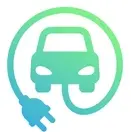EV sales continue to rise, but the last year of headlines falsely stating otherwise would leave you thinking they haven’t. After about full year of these lies, it would be nice for journalists to stop pushing this false narrative that they could find the truth behind by simply looking up a single number for once.
Here’s what’s actually happening: Over the course of the last year or so, sales of battery electric vehicles, while continuing to grow, have posted lower year-over-year percentage growth rates than they had in previous years.
This alone is not particularly remarkable – it is inevitable that any growing product or category will show slower percentage growth rates as sales rise, particularly one that has been growing at such a fast rate for so long.
In some recent years, we’ve even seen year-over-year doublings in EV market share (though one of those was 2020->2021, which was anomalous). To expect improvement at that level perpetually would be close to impossible – after 3 years of doubling market share from 2023’s 18% number, EVs would account for more than 100% of the global automotive market, which cannot happen.
Instead of the perpetual 50% CAGR that had been optimistically expected, we are seeing growth rates this year of ~10% in advanced economies, and higher in economies with lower EV penetration (+40% in “rest of world” beyond US/EU/China). Notably, this ~10% growth rate is higher than the above Norway example, which nobody would consider a “slump” at 94% market share.
It’s also clear that EV sales growth rates are being held back in the short term by Tesla, which has heretofore been the global leader in EV sales. Tesla actually has seen a year-over-year reduction in sales in recent quarters – likely at least partially due to chaotic leadership at the wayward EV leader – as buyers have been drawn to other brands, while most of which have seen significant increases in EV sales.



I just assumed people are buying less Teslas, as everyone seems to have finally noticed what a POS they are.
And yet they’re still in many ways the best EVs available.
I think people are buying fewer Teslas because
Yeah, sure, that’s why. https://www.tesladeaths.com/
Edit: Don’t stop downvoting, but for comparison please go here and pull down “Midsize” & “Luxury Cars”: https://www.iihs.org/ratings/driver-death-rates-by-make-and-model
There is one model in that size worse than the Tesla 3, so it’s got that going for it! Wonder why the 2WD version is so much safer.
I don’t know why they’re categorizing the 3 in “luxury cars” but if you look at the actual numbers it’s about the same as a Camry, which is in line with what I’d expect.
Did someone make a “f150 deaths”, or a “honda civic deaths” website? I’d be curious to compare because 555 deaths in 4.5 million cars sold sounds to me like a pretty good number, actually; it’s around 0.01% of cars.
Looking at the StatsCan website, looks like there were 1.5 million cars sold in 2022 and 1931 fatalities, which would bring the industry average to around 0.12% of cars, about 10x worse. Of course, not only new cars were involved in crashes, so I’m not entirely sure it’s an accurate comparison, but from what I can tell, your sources aren’t actually making the points you think they’re making.
I wonder how that compares to other manufacturers. I’ve seen comments starting that teslas get in more accidents per mile driven compared to other brands but haven’t seen raw numbers.
There’s not enough transparency or detail.
A criticism of Tesla’s data is an accident is determined by airbags so is not directly comparable to other numbers. A criticism of Lending Tree is the data compiling reports to insurers/lenders but Teslas are expensive to repair so more likely to claim.
Either way, Teslas are 5 star safety rated so very good at protecting their occupants
If you want to create an argument against Tesla this is not the way to do it, they are by far THE SAFEST car on the market despite their full autopilot failure.
People should be outraged by the fact that there was not a single recorded death from a car accident until Tesla came onto the scene.